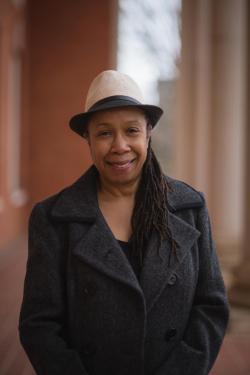
Rhondda Robinson Thomas is the Calhoun Lemon Professor of Literature at Clemson University where she teaches early African American literature and American literature. She has published Claiming Exodus: A Cultural History of Afro-Atlantic Identity, 1774-1903 and co-edited The South Carolina Roots of African American Thought. She contributed the “Locating Slave Narratives” chapter to the Oxford Handbook of the African American Slave Narrative, is the acquisitions co-editor for the African American Literature series at the Clemson University Press/Liverpool University Press partnership. Her essays have appeared in American Literary History, Southern Quarterly, and African American Review. Dr. Thomas is also the director of the award-winning Call My Name: African Americans in Early Clemson University History research project for which she has been awarded a Whiting Foundation Public Engagement Fellowship, a gift from Dr. James and Edith Bostic Jr. through the Clemson University Foundation, and grants from the National Endowment for the Humanities, SC Humanities, and Clemson University’s Office of the Provost.
Could you tell us a bit about your new book?
Call My Name, Clemson presents a three-stranded narrative about the development of my award-winning Call My Name: African Americans in Clemson University History Project, Clemson University’s slow embrace of a commitment to document and share its complete and complex history of being built as a segregated institution for white males on John C. Calhoun’s former Fort Hill Plantation, and snippets of my life story as a sixth-generation South Carolinian who returned to my home state to work at a university that my South Carolina-born parents and grandparents were barred from attending during the Jim Crow era. Its narrative style draws on the call-and-response tradition, with guest contributors issuing calls that my book chapters respond to regarding the necessity of calling the names and sharing the stories of African Americans who have contributed to the development and success of Clemson University.
What does your daily practice look like for your writing? Do you have a certain time when you write? Any specific routine?
I rise early to write in my home office on my MacBook Air from about 4:30-6:30 AM when my house and the world are still relatively quiet. I usually give myself a specific task, such as writing a certain number of words or revising a certain number of pages, so that I experience a sense of accomplishment.
What are you currently reading right now? Are you reading for research or pleasure?
I’m reading Toni Morrison’s Paradise and Salamishah Tillet’s Sites of Slavery: Citizenship and Racial Democracy in the Post-Civil Rights Imagination, both for research.
Tell us about where you are from -- what are some favorite details you would like to share about your home?
I am from Anderson, South Carolina, a city that sits halfway between Atlanta and Charlotte. My home is located in a very walkable neighborhood, which has come in handy during the pandemic. I take a 3.5 mile powerwalk around my neighborhood weekdays after my early morning writing routine, even when there’s a drizzling rain. One of my favorite details about my home is a colorful Jonathan Green signed print hanging in my office, which is a source of inspiration and joy.
Do you have writing prompts you could share to inspire us?
- After the pandemic, I’m gonna . . .
- During the pandemic, I’m gonna keep . . .
- Write about the time you traveled to Wakanda with the Black Panther.
Thank you Rhondda!